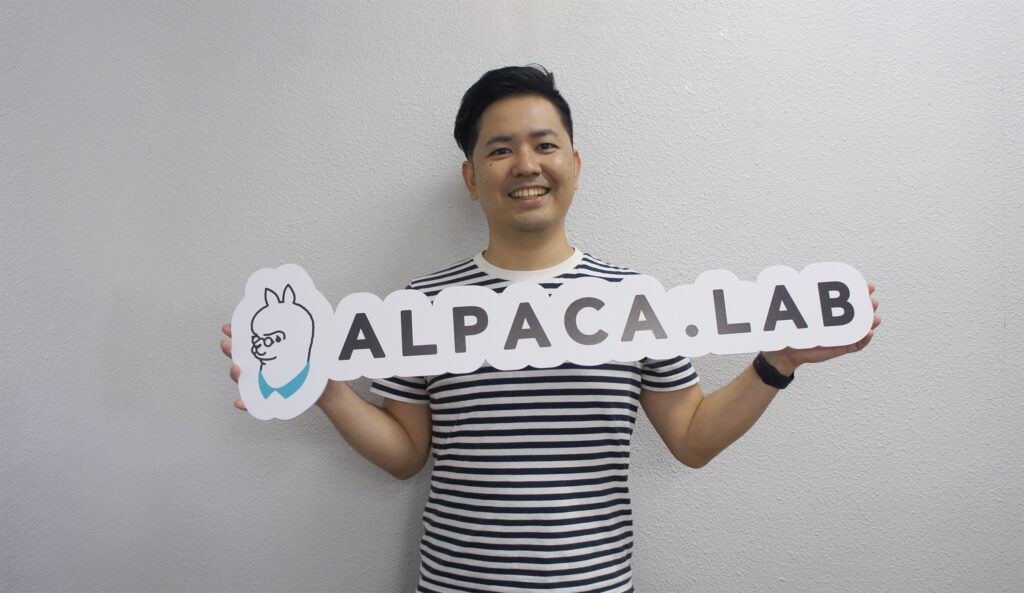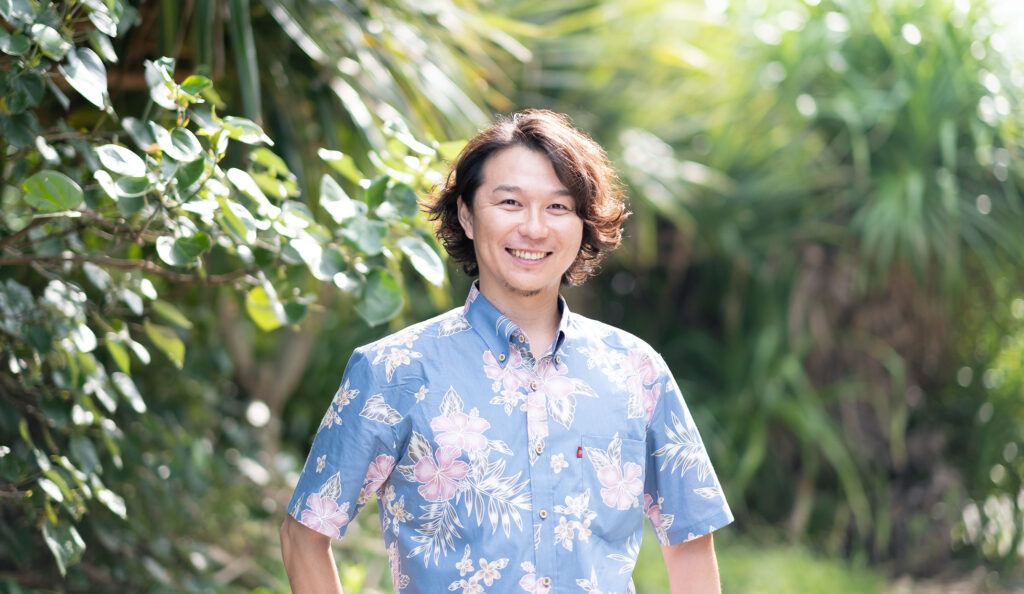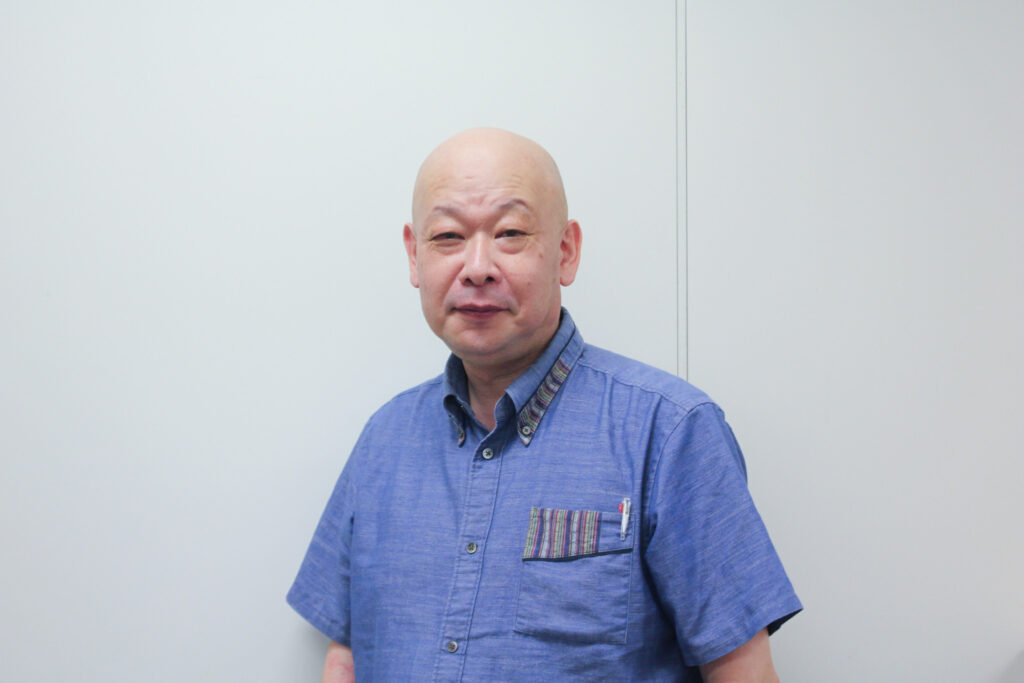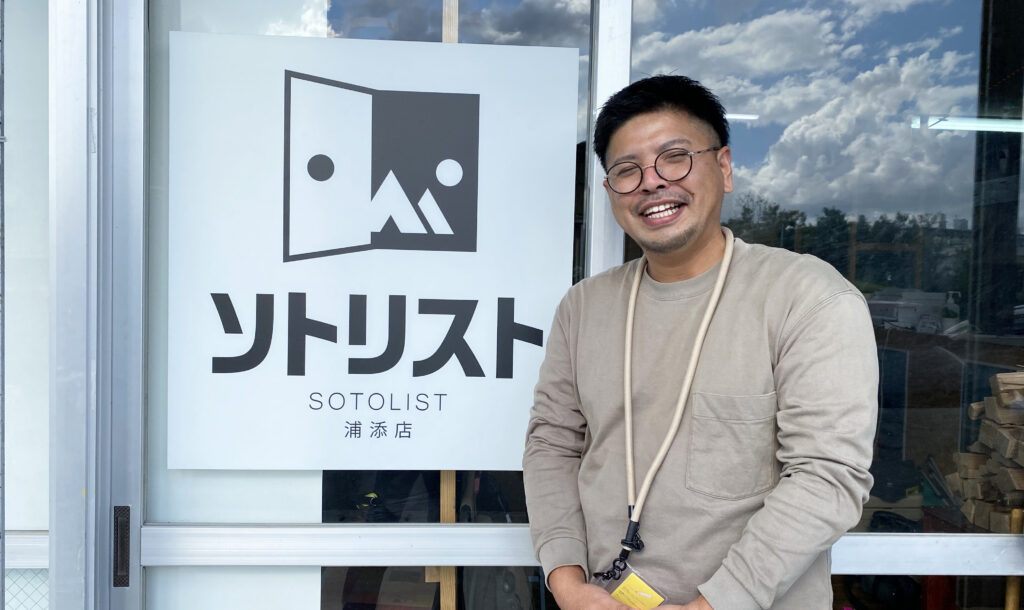The general consensus is that Okinawa faces numerous social issues such as poverty, base-related problems, and regional infrastructure issues. However, on the flip side, the abundance of these challenges can be reframed as numerous ‘business opportunities’ to resolve them. Such businesses could serve as role models for other prefectures facing similar issues and potentially create new employment opportunities. Under such a sense of mission, we spoke with Mr. Namihara Ikuma, CEO of Alpaca.Lab, who is driving the company forward with this vision.
From Okinawa comes “AIRCLE,”
the largest nationwide driving service dispatching app.
Although unfamiliar to urban dwellers, ‘driving services’ are commonly heard terminologies in regions with fragile public transportation systems, specifically referring to the abbreviation for ‘automobile driving service.’ A team of two staff members equipped with secondary driving licenses rushes to the scene with an accompanying vehicle. They take over the driving responsibilities for individuals who have consumed alcohol at restaurants and safely transport them to their intended destinations.
Traditionally, these services were requested via ‘phone calls.’ However, especially on weekends, callers often faced rejection due to congestion or were informed of long waiting times. Under such circumstances, there is a significant problem with individuals breaking the prohibition against drunk driving.
Addressing this issue is the service provided by Alpaca.Lab, utilizing AI technology in their driving service dispatching app, ‘AIRCLE ,’ which aims to revolutionize the current situation.
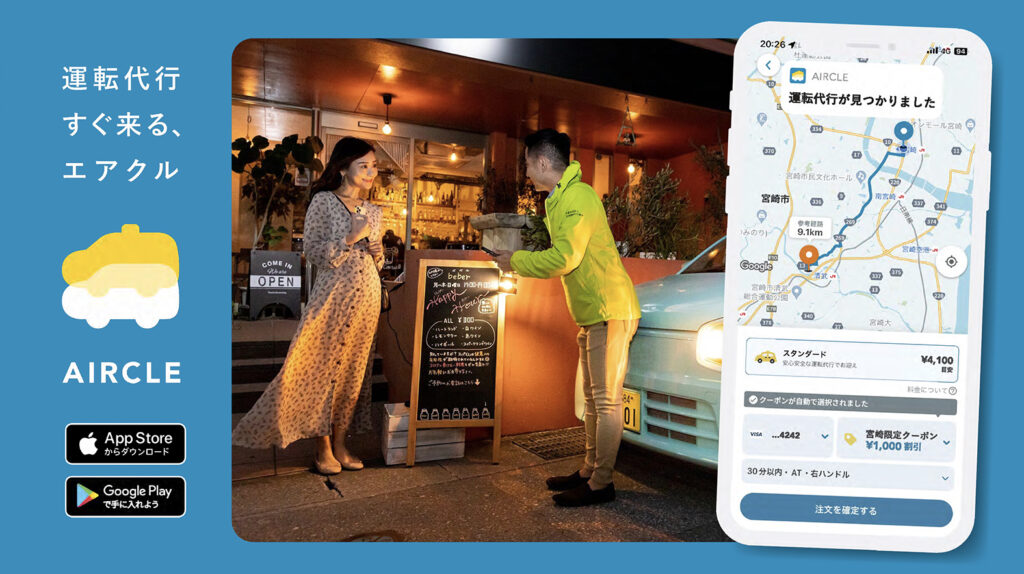
Using it is simple. The customer specifies their current location and destination using the app on their smartphone. Then, based on algorithms, the request is sent to the nearest driving service vehicle, which arrives for pickup within an average of 12 minutes. Customers are also shown estimated fares and arrival times in advance, freeing them from traditional analog request methods and potential fare disputes.
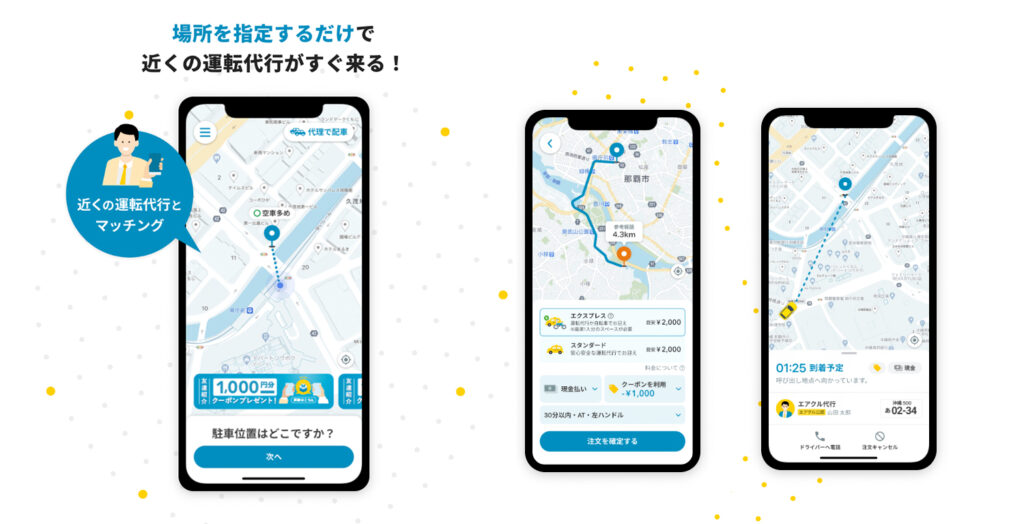
Starting with the official launch on Okinawa Island in August 2020, AIRCLE has been expanding its coverage area. As of March 2024, services have been deployed in Fukuoka City, Wakayama City, Miyazaki City, Saitama City, and Kumamoto City. Despite being limited to specific regions, the number of downloads has exceeded 130,000 and continues to increase.
Wanting to convey not “delegation”
but rather the presentation of a role model for problem-solving.
Takahara, who grew up in Ginowan City, gained experience in educational and industry-academia collaboration projects after graduating from the University of Advanced Science and Technology in Hokuriku. In 2018, he co-founded Alpaca.Lab with his colleagues and devoted himself to the development and release of Aircrew.
Despite being raised in a car-centric society in Okinawa, one might assume Takahara had a longstanding interest in starting a business related to driving services. However, he revealed an unexpected backstory to AIRCLE’s development: “It wasn’t that I always wanted to do driving services from the beginning.” He explained, “Originally, I aspired to be a researcher. Although I realized it wasn’t my forte and gave up on that path, I’ve always loved the knowledge and technology that universities possess. I believe that true movers and shakers of the world are not entrepreneurs but those called researchers.”
However, Takahara continued, even if university researchers conduct fascinating studies beneficial to society, they often struggle to gain understanding from large corporations or local communities, hindering social implementation. “It’s saddening,” he continued, “that despite profitable companies having a moral obligation to invest in such ventures, they refrain from venturing beyond their own areas of expertise. I believe the stagnation of Okinawa’s economy, along with issues like educational challenges and the cycle of poverty, are the result of this.”
He paused, his expression darkening. “So, I thought, if someone doesn’t step up and show them, how will they understand? I, an ordinary person, wanted to demonstrate that with investment from well-known local companies and leveraging the technological expertise of university professors, we could solve societal issues that have persisted for decades in just a few years. I wanted to showcase that as a role model for young people and large corporations.”
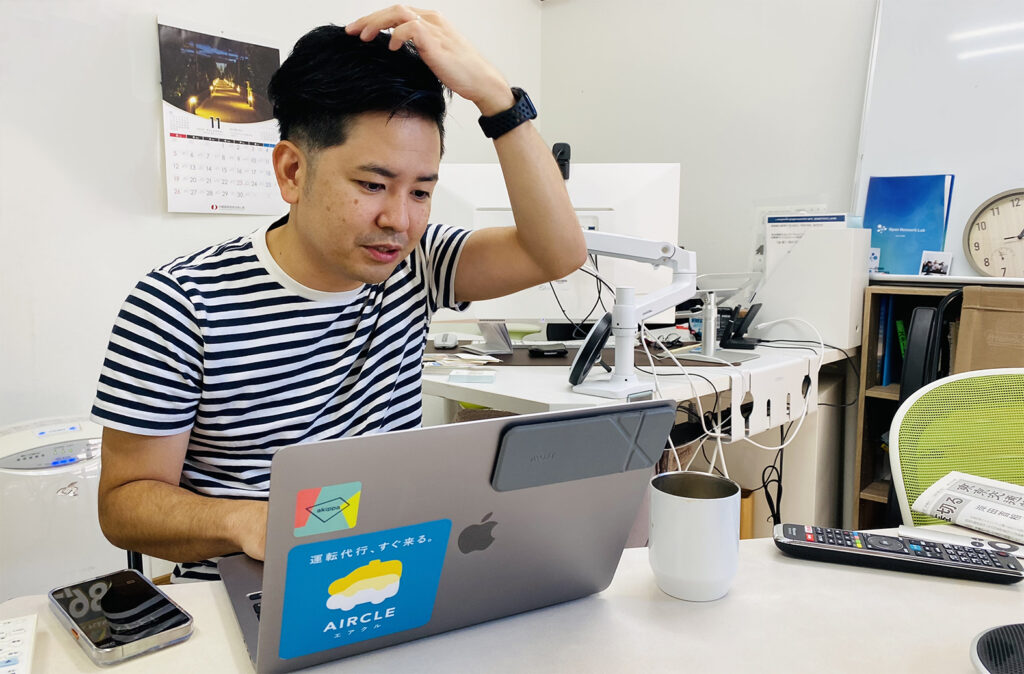
And thus, Alpaca.Lab was launched, with a single word from a professor at the University of the Ryukyus, suggesting, “Why not try driving services?” becoming the first step towards AIRCLE.
“As I researched driving services, I realized that not only was there satisfaction in solving problems, but also, if successful in Okinawa, it could serve as a model for addressing similar issues in other prefectures,” Takahara explained.
Subsequently, with the assistance of Professor Okazaki from the Faculty of Engineering at the University of the Ryukyus, collaborative research and development in AI progressed, including algorithms for predicting order placement locations and quantities, optimizing dispatch through estimation of demand distribution, and more. This collaboration has continued to this day.
What was created wasn’t just an “app”!
It’s a “platform” designed to break the cycle of negativity.
According to Takahara, there are currently nearly 8,000 driving service providers nationwide, with a market size exceeding 250 billion yen. However, he notes that it’s an industry plagued by a “cycle of negativity.”
“Analog operational management relying on intuition and experience, resulting in inefficient business practices, staff shortages, missed opportunities, and an inability to establish appropriate pricing due to excessive competition,” Takahara explained, shedding light on the current situation of the driving service industry, which is not widely known to the public.
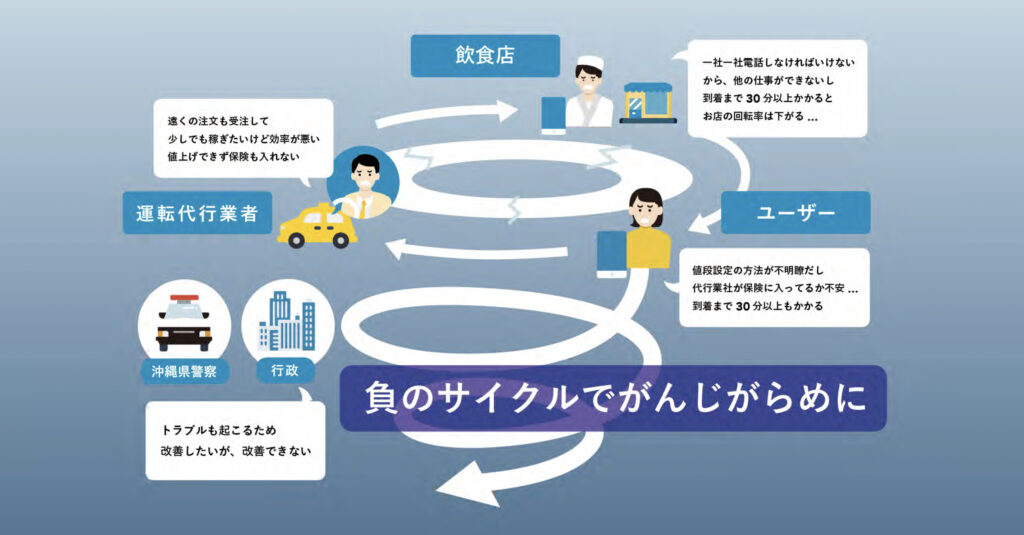
The collapse of pricing contributes to the proliferation of unscrupulous operators, leading to uninsured or unlicensed operations and escalating into major troubles in the event of accidents, resulting in disadvantages for customers as well.
“If it were only illegal activities in the driving service sector, the police and authorities could crack down on them. But that wouldn’t solve the negative cycle in the industry,” said Takahara. “So we decided to ‘create a platform.’ It’s also a university-style approach.”
“If we just create a ‘convenient service’ without unraveling the root of the problem, ultimately, someone will be dragged down, and customers will revert to ‘cheaper is better’ mentality, returning to square one. To change the current situation, we need to lay down a platform, someone needs to wave the flag, demonstrate better conditions, persuade, and sometimes even educate people on how things should change,” he continued.
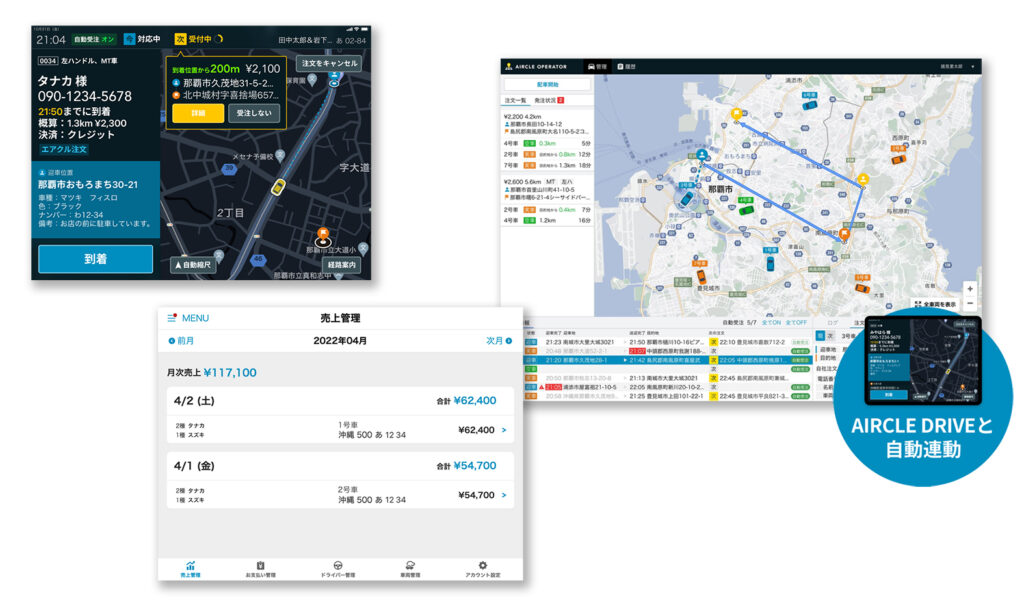
In 2019, Alpaca.Lab signed a comprehensive cooperation agreement with the driving service association. Patiently conveying the vision of industry soundness, listening to frontline feedback, and developing AI and systems to streamline analog and complex operations, they encouraged adoption. Their efforts have gradually deepened industry understanding, resulting in the registration of over 200 service providers and more than 510 vehicles to date.
Using the COVID-19 crisis as a springboard for growth, the next stage is centered around the keywords of people, vehicles, and goods.
However, the completion and official release of the AIRCLE product occurred right in the midst of the COVID-19 pandemic, during a period of refraining from social gatherings, including drinking parties. Even to the layman’s eye, it was the worst possible timing for a service targeting intoxicated customers. We asked if they faced any difficulties during this time.
“Of course, sales were tough, and the growth was delayed due to the circumstances at that time. But on the flip side, thanks to COVID, we were able to secure financing on advantageous terms, and it also gave us time to carefully consider the future expansion of our driving service dispatching business. If anything, I’m positive about it. Without COVID, I think our company might have gone under by now,” Takahara replied optimistically.
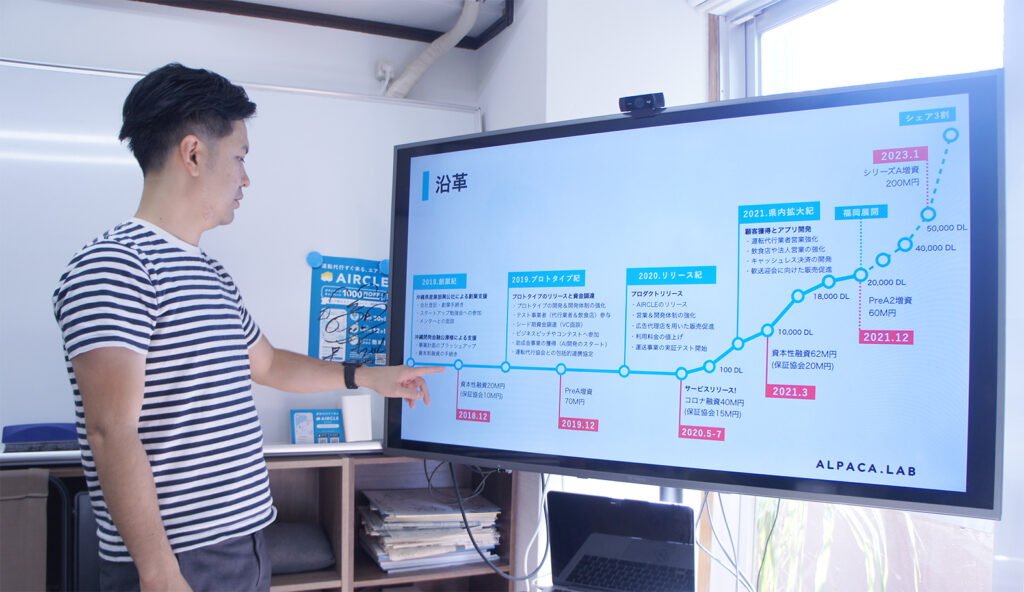
The company conducted a Series A fundraising round in June 2023, raising a cumulative total of 500 million yen. In February 2024, a new service model was implemented for Aircrew. Introducing the “AIRCLE ONE,” a service where instead of traditional driving services, a staff member arrives on an electric kick scooter, folds it up, and rides along with the customer in their car.
This innovative approach allows for employment with just a regular driver’s license, eliminating the need for accompanying vehicles that incur personnel and gasoline expenses. It’s a clever move that addresses both the shortage of manpower and significantly reduces costs. Takahara further explained, “Moving forward, we aim to expand our business model to not solely rely on the demand from intoxicated customers.”
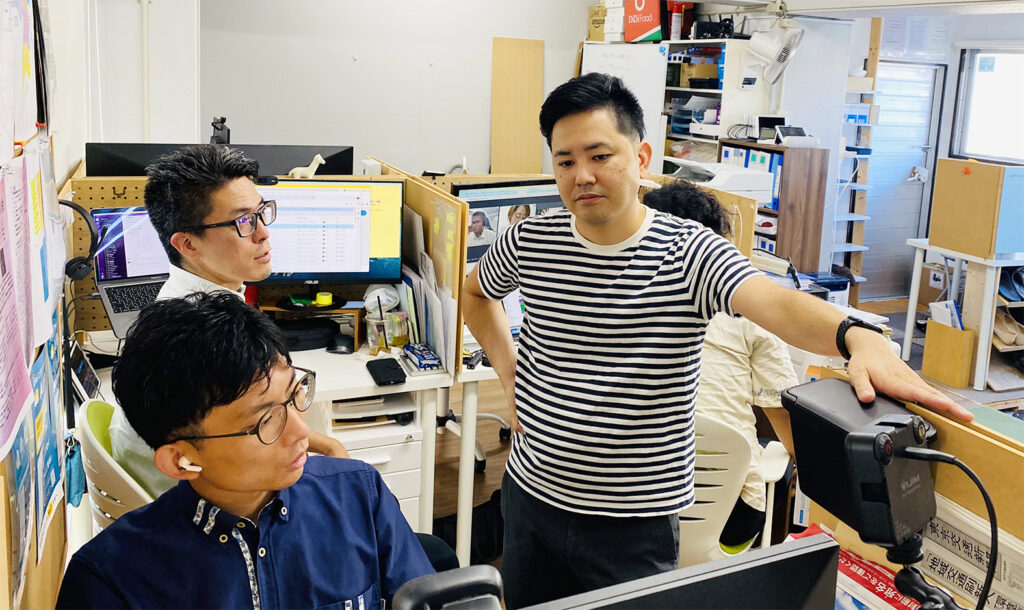
“There’s no doubt that driving service resources are useful for the movement of people, vehicles, and goods, so I believe the business will naturally expand,” he said. Regarding the expansion of AIRCLE’s release area, he added with a laugh, “Since we’re confident in our product, we’re considering adding about 18 more regions. Dream big, right?”
When asked for a message to those considering entrepreneurship, he hesitated a bit, saying, “Hmm…I don’t want to impose my values, but…” before continuing.
“I’m not very efficient, and I have to work twice as hard as others to achieve the same output (laughs), but in the startup venture world, if you produce results, you win. Instead of conforming to others, if you feel any discomfort or have something you want to do, remember that there’s always the option to stand up, start a business, and live that way.”
Takahara describes himself as an average person, someone who finds it difficult to fit into society’s norms. It’s precisely because of this that he earnestly considers, acts, and continues to pursue the ideal of expanding the circle of solving social issues.
Interview and Japanese Text by Narabayashi Minako

